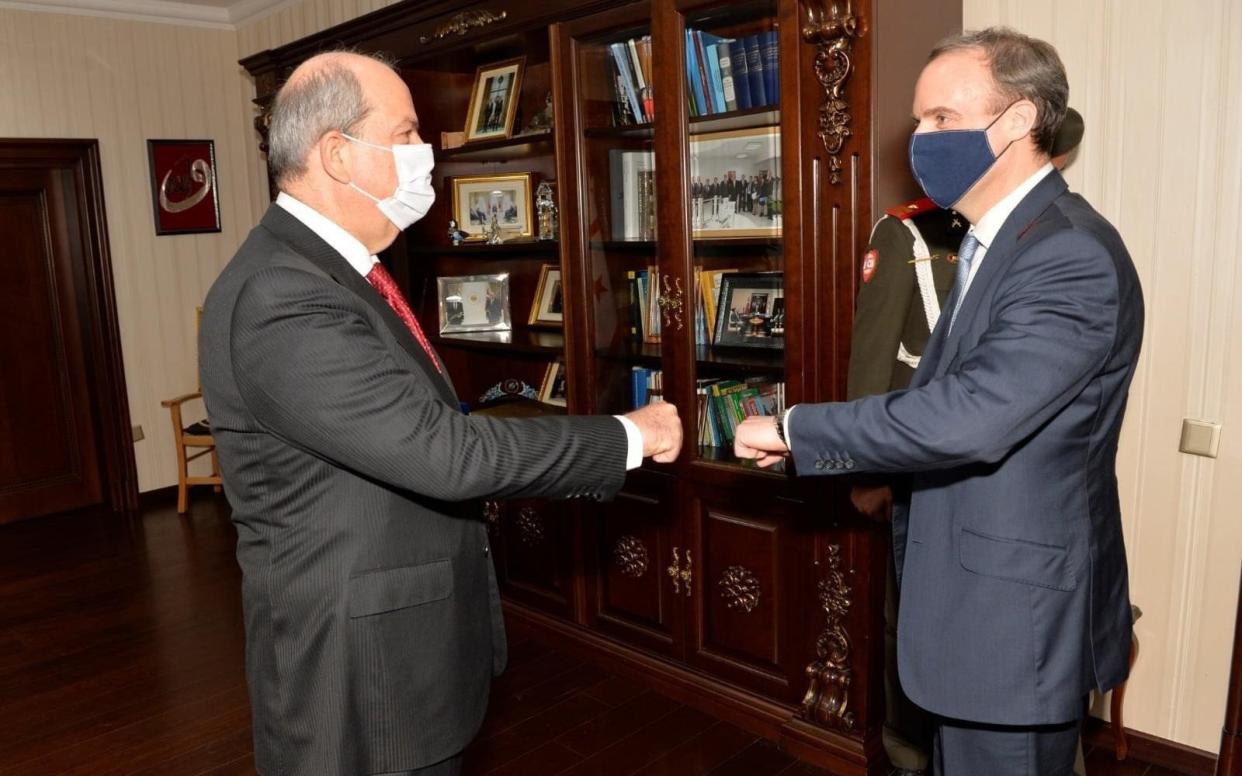Raab warned not to violate 'red lines' over Cyprus after meeting leader of breakaway north

- Oops!Something went wrong.Please try again later.
Dominic Raab has been accused of violating “red lines” on Cyprus after meeting the leader of the breakaway north.
In a letter seen by The Telegraph, Fabian Hamilton, Shadow Minister for Peace and Disarmament, and Catherine West, Shadow Minister for Europe and the Americas, have written to the Foreign Secretary expressing concern that he is “considering breaking from the longstanding position of successive UK governments”.
It comes after Mr Raab called “for all sides to be flexible” earlier this month, ahead of United Nations talks to heal the longstanding divisions within Cyprus.
It is understood that the UK’s position has not changed on Cyprus.
In the letter, Mr Hamilton and Ms West write that since the Turkish invasion in 1974, both Labour and Conservative-led UK Governments have “committed to the reunification of the island on the basis of a bi-zonal, bi-communal federal political settlement”.
However they accuse Mr Raab of not having made this “publicly clear” on his recent visit to the country.
“As penholder for Cyprus at the UN, the UK has a historic responsibility to the people of Cyprus and to reaching a settlement that sees the island reunited," they say, as they called on the UK to "uphold its non-recognition of the occupied north of Cyprus in order to avoid bending our historic red lines".
They add that it is “particularly worrying” that during the visit Mr Raab met with Ersin Tatar, the President of Northern Cyprus; the self-declared Turkish Republic which is recognised only by Ankara.
However it is understood that it is not unusual for the UK to meet with members of the Northern Cypriot government.
Mr Raab recently said that “the UK continues to support a comprehensive, just and lasting settlement of the Cyprus issue, based on the existing parameters as set out in relevant Security Council Resolutions”.
While visiting Cyprus on February 4, he spoke at a press conference alongside Cypriot Foreign Minister Nikos Christodoulides, where he said: “The UK feels we are also a long standing friend of the Cypriot people across the island. So we want to see a permanent, enduring and lasting end to the dispute.”
The letter adds that in order to quell the “considerable anxiety” now felt among the Republic of Cyprus and the British Cypriot community in the UK, Mr Raab must commit “to a bi-zonal, bi-communal federation for the Island of Cyprus” and oppose “all drilling by Turkey in the Republic of Cyprus’ Exclusive Economic Zone”.
They also call for the “withdrawal of all Turkish military personnel” and to stop “the resettling of the resort of Varosha”.
Last November, Turkey’s president, Recep Tayyip Erdogan, stoked tensions by declaring he would have “a picnic” amid the ruins of Varosha, a ghostly suburb of the coastal city of Famagusta.
Varosha used to belong to Greek Cypriots but tens of thousands of them had to flee when the Turkish army invaded the island, in response to a coup intended to annex Cyprus to Greece.
Next month Mr Raab will join the foreign ministers of Greece and Turkey, at a UN summit at the U.N to discuss the future of Cypriot reunification talks.
At the end of the letter they wrote “it’s vital that the UK upholds its historic commitment to the people of Cyprus and to the protection of the sovereignty of the Republic of Cyprus”.

